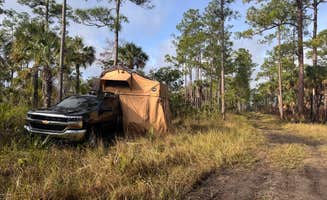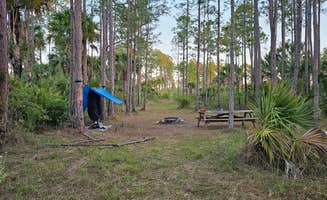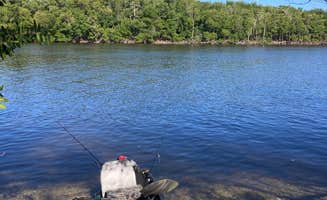Primitive camping near Immokalee, Florida primarily centers on backcountry sites within Big Cypress National Preserve and the Everglades National Park. This region features subtropical wetland ecosystems with water levels that fluctuate seasonally, affecting trail conditions and campsite accessibility. Winter months bring moderate temperatures averaging 50-75°F, while summer temperatures regularly exceed 90°F with intense humidity and frequent afternoon thunderstorms.
What to do
Paddling adventures: Access Backcountry Crooked Creek Chickee via kayak or canoe for unique fishing opportunities. "Fishing is epic, even from the chickee. Stay quiet and look under the platform, tarpon, snook and drum were always around," notes reviewer Paul W., who recommends planning around tide schedules as currents can reach 3-4 knots.
Wildlife observation: The wetlands surrounding primitive campsites host diverse wildlife including wading birds, alligators, and occasionally the elusive Florida panther. Multiple water holes near campsites provide wildlife viewing opportunities, though caution is advised.
Star gazing: The remote nature of Nobles Primitive Camp creates minimal light pollution for exceptional night sky viewing. Trevor G. describes it as "Great remote drive out to the primitive site 'old florida'" with marshland adjacency offering unobstructed horizon views.
What campers like
Remote solitude: Many visitors appreciate the isolation of Panther Camp, located 5 miles from the entrance on the Blue trail. J R. notes it's a "Great spot to disconnect. Primitive. Free," with space for "10+ tents and hammocks" in a maintained tree grove.
Cost-free camping: All primitive sites within Big Cypress National Preserve are available without fees, though permits are required. Campers appreciate the accessibility of wilderness experiences without financial barriers.
Cell connectivity: Despite remote locations, cellular service is surprisingly available at select sites. According to J R., Panther Camp offers "Strong cell signal due to cell towers at the rest stop," allowing limited connectivity while maintaining wilderness immersion.
What you should know
Water logistics: No potable water exists at primitive campsites. Campers must carry in all drinking water needs. While natural water sources exist, they often contain wildlife. J R. notes at Panther Camp "There is a water hole in the back of the camp which can be filtered. However a gator generally lives there. Better to pack your water in."
Permit requirements: All overnight stays in Carpenter Primitive Camp and other Big Cypress sites require permits obtained either online or at visitor centers. Permits help rangers track wilderness usage and ensure camper safety during emergencies.
Access challenges: Many primitive sites become difficult or impossible to reach during wet seasons. Most access roads are unpaved and may require high-clearance vehicles after rainfall events, particularly from June through October.
Tips for camping with families
Campfire opportunities: Unlike platform camping in Everglades National Park, Big Cypress sites generally permit campfires, providing family-friendly evening activities. Gather firewood before arrival as none is provided at sites.
Insect preparation: Mosquitoes and biting flies can be intense, particularly during dawn and dusk. Paul W. reports at Ivy Primitive Camp: "Bugs were tough sunset and sunrise," suggesting families bring appropriate repellents and protective clothing.
Education resources: Prior to camping, download Junior Ranger materials from the Big Cypress National Preserve website to enhance children's understanding of this unique ecosystem during your visit. Rangers occasionally patrol remote sites and can provide educational interactions.
Tips from RVers
Size limitations: No primitive campsites near Immokalee accommodate large RVs. Vehicle-accessible sites like Nobles Camp can handle small trailers or campervans during dry conditions, but interior access roads restrict larger rigs.
Self-contained requirements: With no facilities available, RVers must be fully self-contained with adequate water, waste storage, and power. Pack additional water beyond normal usage estimates due to heat considerations.
Road conditions: Trevor G. reports that while accessing Nobles Camp, "Luckily the access road was drivable with two wheel drive," but notes "One way in one way out" with road transitions from "paved road turns to dirt/gravel." This limits evacuation options during weather events.




